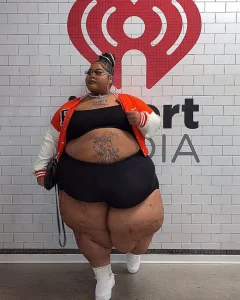A rapper from Michigan is suing Lyft because they wouldn’t pick her up because she was too fat. People have been talking a lot on social media about body shaming, passenger rights, and what gig economy workers should do about it. Dajua Blanding, a 36-year-old artist who goes by the stage name Dank Demoss, says that a Lyft driver wouldn’t pick her up because they thought she was too big for the car and that her weight might hurt it. Blanding filmed the meeting and posted it on Instagram, where it quickly went viral and got a lot of comments, some of which agreed with her and others of which disagreed with her.
Earlier last month, Blanding asked for a ride through the Lyft app, which triggered the fight. She says in her lawsuit that the driver pulled up in a Mercedes-Benz and shut the doors when he saw her. After that, he sought to leave. Blanding walked up to the car and started filming. In the video, she calmly adds, “I can fit in this car.” The driver keeps telling her she can’t, and at one point she says, “Trust me, you can’t.” He then cancels the ride and tells her she won’t have to pay for it.

Blanding says that even though the chat didn’t lead to a ride or payment, it was very taxing on her emotionally. Later, she told an interviewer that the meeting made her feel uncomfortable and singled out only because she was so big. She added, “I’ve been in cars that are smaller than that.” “I just want them to know that it made me sad.” Since then, she has sued Lyft, saying that the company lets its drivers act in a discriminatory way and doesn’t make sure that all passengers can use the platform safely and comfortably.
There aren’t many states that make it criminal to treat someone unfairly because of their weight. Jonathan Marko and Zach Runyan, her lawyers, said that the driver broke the Elliot-Larsen Civil Rights Act by not giving her a ride because of her ethnicity, height, weight, or religion. Marko added, “I knew it was wrong and against the law.” He further said that not aiding the driver was the same as not helping someone because of their race or religion. Runyan also talked about the possible safety issues and what might have happened if Blanding had been left alone in a dangerous place. He remarked, “It’s not only illegal to not give someone a ride because of their weight, it’s also dangerous.” “Things could have been a lot worse than they were.”

A lot of people commented on the popular video on Instagram and other sites. Many of the people who answered agreed with the driver and said he had the right to protect his car if he honestly thought the passenger’s size could be a problem. People argued that Blanding should have picked a bigger car, such a Lyft XL, which has more space. Someone replied, “Putting too much stuff in a car is against the law.” The driver was nice, told the person why he was doing what he was doing, and even said he was sorry. “Look at things from a different point of view.”
Blanding stayed strong even when people were mad at her. In the caption accompanying her Instagram picture, she aggressively called out Lyft and requested them to take action. “Am I wrong?” she inquired. “Lyft, what do you think of the driver who was rude to me? “You all treat big people terribly.” It feels like we don’t belong here. She further alleged that the driver didn’t just say no to giving her a ride; he also said that her weight could damage his tires. In the video, she says, “What do I have to do with your tires?” This suggests that she doesn’t believe the reason offered for not getting a ride.

A few days after the first video went viral, Blanding posted another one to Instagram. She contacted Lyft again this time while wearing a hoodie and yoga shorts. She said, “I’m trying to get Lyft to let me in the car without judging how much I weigh!” “Please let me in.” I’ll see you at the afterparty for Sexyy Red, though. It was evident that people who are plus-sized are often judged and left out in ways that aren’t always clear, even though her fun tone was different from the serious nature of her case.
Blanding has talked about her health and physique journey in front of other people before. In a post from December, she said she weighed more than 500 pounds, but since then she has lost more than 40 pounds. People who like how honest she is and how she feels about her body have followed her, but she has also been criticized online.

Lyft responded in a statement that all forms of discrimination are wrong in reaction to the complaint and the widespread attention it got. “We strongly condemn all forms of discrimination,” the company added. “We believe in a community where everyone is nice and polite to each other.” Our community’s rules and terms of service make it very clear that you can’t harass or discriminate against anyone. The business didn’t say anything about the case’s circumstances or the driver’s current status, though.
The case brings up difficult considerations about how to find the correct balance between a driver’s right to make safe and comfortable decisions and a rider’s right to be treated fairly, no matter what they look like. As the legal process goes on, there will probably be more conversation about how companies like Lyft should deal with claims of discrimination based on body size, especially in states where this kind of discrimination is against the law.

Blanding’s case isn’t just about one negative experience; it’s about sticking up for fairness and respect. She has made it plain that her purpose is to draw attention to the bigger issue of how plus-sized persons are often regarded as if they don’t exist or are a problem in public services. We don’t know if her action will change the law or set a legal precedent, but it has started a national conversation about inclusion, accountability, and the unfair treatment that many people endure every day, even when they are just trying to get home.
